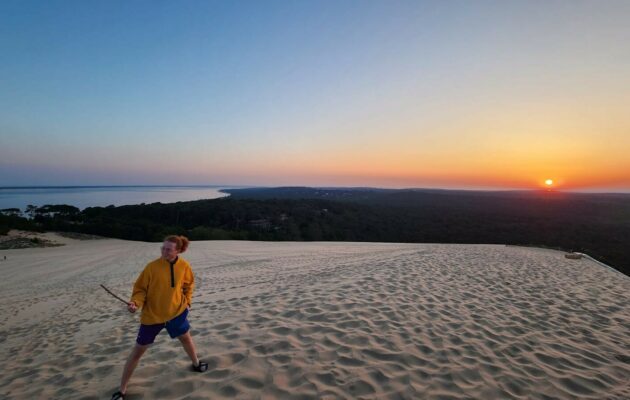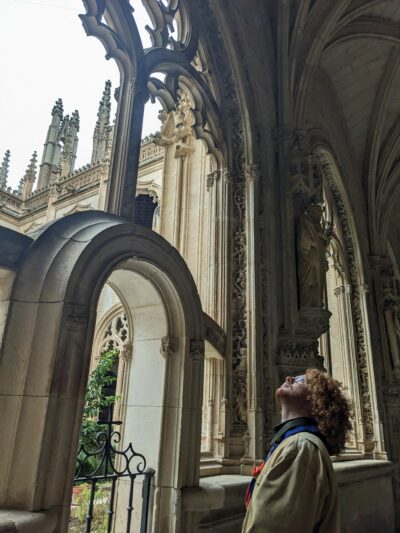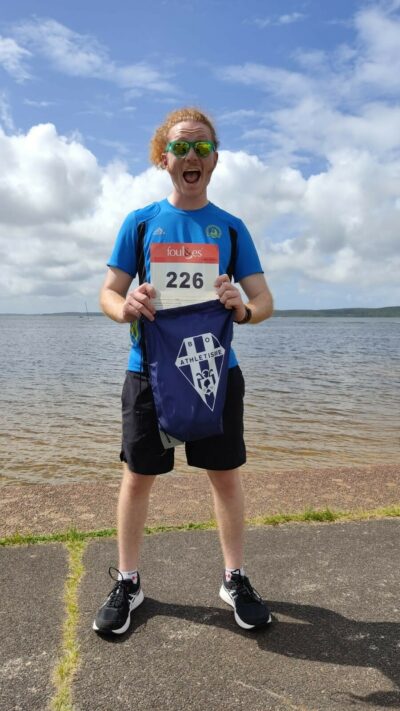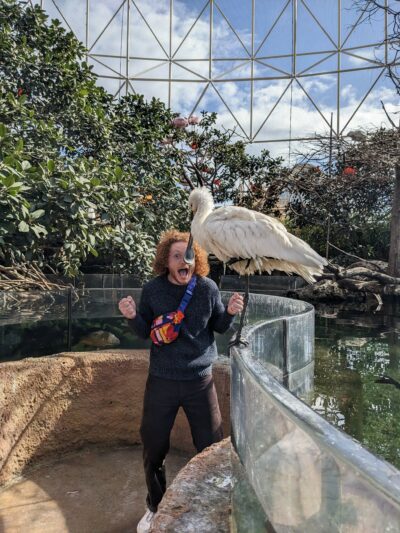
We’re asking students, recent grads, teachers, and counselors five questions on how languages play a role in shaping personal and professional success…
Meet Abe—a McGill University graduate from Massachusetts who majored in history with minors in linguistics and world religions.
1. When did you start learning French, and what initially sparked your interest in the language? Was there a moment when your motivation to learn the language shifted?
I began learning French in 6th grade, when studying a world language became mandatory at my middle school.
Although taking Spanish classes was more popular among my friends, I was spurred to follow the French track by my curiosity for my French ancestry: grandparents we called grand-mère and grand-père, a last name I didn’t know how to pronounce, and being forced to try bleu cheese at every family gathering, much to my chagrin.
Along with greatly enjoying French class, I was further driven to continue my studies when my older cousin participated in the Teaching Assistant Program in France (TAPIF) in Perpignan while I was in 7th grade; it was one thing to be vaguely connected to the country, but pointing to a map and saying “my family is THERE” was such an exciting concept to me.
2. You’ve completed two study abroad stays in France: a two-week exchange program during high school and a semester in Strasbourg during college! What would you say were your biggest takeaways or most memorable moments/lessons from these experiences?

These experiences were wildly different but both incredibly exciting and informative.
My high school exchange was my first lesson in how language can connect people: I grew very close with my American peers as well as our French correspondents, and vaguely chaotic moments like getting separated on the metro only brought us closer together.
I relied on my French abilities more independently in Strasbourg, being part of a rather hands-off program. It was thus really rewarding to find my way in a new place, namely through joining a wonderful chorus, handling medieval documents in the city archives as part of a history course, and experiencing Strasbourg’s famous Christmas markets. Both are experiences I really cherish.
3. Could you share with us about a time that you used your language skills outside of the classroom while attending university in Montreal, a bilingual city?
During a French course at McGill, I was assigned to make a presentation on a Quebecois artist. Although I picked and presented on a local musician I hadn’t heard of, I ran into the very same artist a couple of months later while working as a barista. The experience working at the café was difficult, but meeting him and sheepishly admitting that I presented on his work was well worth my bilingual struggles.
4. Congratulations on being awarded a Teaching Assistant Program in France (TAPIF) fellowship this past year! Please tell us what this involved and what's been the best part about participating in TAPIF? Your assignment was situated in France’s Bordeaux region: What have you learned about this unique region since arriving?

Thanks! It was a blast, in large part due to my unique teaching schedule.
My time was split between a middle school and a technical high school, so I was working with 12-15 year olds on everything from pronunciation and grammar to slang, and with high schoolers on electrical engineering vocabulary and short films.
Although my highly divided schedule meant that I wasn't able to forge the deep connections with students I'd hoped for, I found such connections through living with other language assistants. Hailing from North, Central, and South America, it was immensely gratifying to experience this year together—from sharing recipes and slang from our respective homes to hosting loup-garou soirées and taking countless walks in the woods. Our own “Auberge Espagnole” was nothing short of family, for which I’m incredibly grateful.
Having previously traveled to Strasbourg and Paris, I was keen on exploring a new corner of this big nation. Though I had no previous connections with Bordeaux or with my eventual region of Landes, the Bordeaux academy encompasses the Basque country to the south where I have familial ties. Though my dad was born in Los Angeles and was never able to visit his ancestral homeland, I have been fortunate enough to meet far-removed cousins, visit our family’s sheep farm that spans generations, and reconnect once-separate branches of our family tree.
It has been incredibly meaningful to walk these genealogical footsteps while also finding my own path in Biscarrosse, steps from France’s great lakes and all the pain au chocolat/chocolatines one can ask for.
5. Outside of your work teaching English, what have been some of your favorite creative ways to use and expand your French skills outside the classroom while living in France?
Though my roommates and I conversed in French, my abilities improved most notably through talking with native speakers. Weekly activities like volleyball and chorus served as great practice, as did smaller community events such as drinks with colleagues and barbecues with friends.

That said, my most intensively constructive lessons were also the most haphazard; taking rideshares with strangers is an amazing way to practice! Whether it be a 25-minute ride discussing non-native species’ effects on local ecology or spending 3 hours with a family playing cheese-themed 20-questions and sharing life stories, rideshares of all shapes and sizes have been a great means of expanding my French abilities, connecting with others, and, well, traveling!
BONUS QUESTION
Complete this thought: “Learning another language means…”
Learning another language means leaving my comfort zone and enjoying the unique experiences made possible by this vulnerability.
Check out our Connect with French and Language Programs & Funding pages to explore language scholarships, university programs, testimonials, and more! And, as always, visit @LangConnectsFdn on social media to share your story with us.
